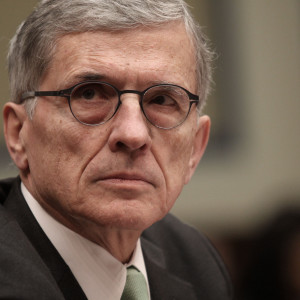The Federal Communications Commission dropped the final version of its much-anticipated plan to unlock the set-top box Thursday, including a number of changes like requiring pay-TV providers to offer their content on apps and the establishment of an FCC body to approve content licensing meets the plan’s competitive goals.
FCC staff revealed the details of the plan to reporters during a conference call Thursday, when senior officials highlighted a number of changes from the agency’s original pitch — most notably, the adoption of a solution from pay-TV providers themselves to offer their content to subscribers on free apps instead of forcing them to pay a monthly fee to rent a set-top box.
Under the plan FCC commissioners will vote on Sept. 29, pay-TV providers like Comcast and DirecTV — known to the FCC as Multichannel Video Programming Distributors (MVPDs) — will have to offer all of the same content subscribers can access via a set-top box on a free app, downloadable by any third-party device with an operating system that’s sold at least 5 million units.
That means Xfinity, Fios and other pay-TV subscribers will be able to watch, record and playback with full DVR and on-demand functionality their content on devices like a Roku, Chromecast, Amazon Fire, gaming console or iOS and Android devices like tablets and smartphones.
Comcast and others pitched the app idea earlier this year as an alternative to the FCC’s initial proposal to have MVPDs open up their raw content streams to third-party devices like Google, who would then build an interface through which users would access the content.
Under Thursday’s plan, Google will still be able to build a box subscribers can buy, but they’ll have to download the app for their MVPD to access its content (though MVPDs are free to provide the code for third-party device makers to build their apps for them if they wish).
The compromise approach seeks to address concerns by the U.S. Copyright Office, members of Congress and FCC commissioners themselves that the previous plan would leave MVPD content more vulnerable to piracy and allow third-party device makers to alter channel placement and undercut commercial placement by selling ads on devices themselves.
Senior FCC officials said the app approach will guarantee channel lineups, advertising, licensing agreements and content distribution deals with programmers will remain unchanged, since MVPDs will control the flow of content from end-to-end.
In return the apps must offer a search functionality that will return all of the content available to a user online or through other services — not just the content offered by the MVPD.
“Consumers will be able to search across the services to which they subscribe — Amazon Prime, ESPN, Netflix, etc., all in one place,” one official said, adding the rules prohibit search discrimination, but allow content providers and MVPDs to broker deals for the order in which results are returned.
“Integrated search also means expanded access to programming created by independent and diverse voices on the same platform as your pay-TV providers,” FCC Chairman Tom Wheeler wrote in a Thursday op-ed announcing the plan. “Consumers will more easily find content even if it’s not on the pay-TV service to which they subscribe.”
It wasn’t all compromise in favor of MVPDs. Under the rules, the FCC will establish its own in-house licensing body to review licensing deals between MVPDs and third-party devices to ensure they meet the FCC’s competitive standards.
“The proposed final rules require the development of a standard license governing the process for placing an app on a device or platform,” the FCC said in a fact sheet on the plan released Thursday. “A standard license will give device manufacturers the certainty required to bring innovative products to market. Programmers will have a seat at the table to ensure that content remains protected. The license will not affect the underlying contracts between programmers and pay-TV providers. The FCC will serve as a backstop to ensure that nothing in the standard license will harm the marketplace for competitive devices.”
There will be a deadline for licenses to be submitted and a quick deadline for FCC review. The agency can only modify license terms if they inhibit the competitive marketplace, they can’t “willy nilly modify the terms of the license,” according to a senior official.
To avoid the hurdle of setting a single standard for transmitting content to devices — something one of the FCC’s two Republican commissioners said MVPDs would never agree on — the FCC made no technological standards beyond the functionality the apps must integrate.
In a blow that runs counter to a request from Google, device makers will be held to the same consumer data privacy standards as MVPDs themselves, which bar using subscriber data for anything other than providing service unless they obtain permission from the user.
Repeating one of Wheeler’s lines repeated throughout the year, officials said smaller and independent programmers will better reach audiences because they will be found on devices alongside mainstream content, though the CEOs of diversity programmers have expressed skepticism.
With regard to the plan’s significant changes compared to the agency’s Notice of Proposed Rulemaking and rules for passage, which require the agency to give a heads-up notice of what it intends to to before passing new rules, officials said they were confident the plan could withstand any legal challenge from the pay-TV industry.
“We’re fine — we have plenty of notice and plenty of input on this topic,” one official said.

